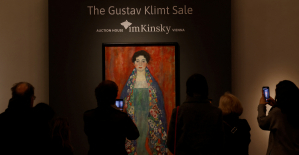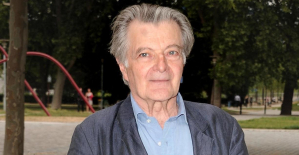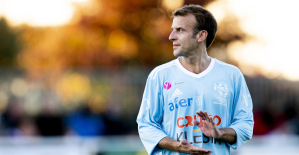Despite Russia's war of aggression against Ukraine, one in four Germans does not see Moscow as a threat to security in this country. According to a survey conducted by Kantar Public on behalf of the Körber Foundation, 25 percent of those surveyed said so. According to this, every second person sees only a minor military threat to German security from Russia, while a good fifth (22 percent) see a major threat.
As expected, trust in Vladimir Putin's policies is greater in eastern Germany than in western Germany. Almost every third person (32 percent) trusts that Russia does not pose a military threat to our security. In the West say so 24 percent.
Men and citizens with higher school qualifications trust Russia above average. The same applies to supporters of the AfD. Almost half of them (46 percent) see no danger for Germany. In contrast, only one in seven (15 percent) of Green voters takes this view.
Political scientist Karl Kaiser (Harvard University) calls the results of the current survey “shocking”. "The fact that half a year after the Russian attack on Ukraine, a quarter of all Germans surveyed do not see Russia as a threat shows a denial of reality," said Kaiser WELT.
The results also revealed “deeper beliefs”. These would "create problems for the federal government when it comes to pushing through the necessary support for Ukraine domestically in a recession and energy crisis," predicted Kaiser, former director of the German Society for Foreign Relations (DGAP).
The Americans are decidedly more critical of Moscow's behavior than the Germans. Only five percent of US citizens see no threat to their country from the Russian army, as the Pew think tank found in response to the same question. Two out of three Americans identify a "major threat" and another quarter a "minor threat". The Körber Foundation and Pew surveys were conducted in August.
Long before the Ukraine war broke out, the governments of Donald Trump and Joe Biden had leveled enormous criticism at the German-Russian Nord Stream 2 Baltic Sea pipeline. At the time, Washington accused Berlin of naivety in dealing with Moscow.
Chancellor Angela Merkel (CDU) and Olaf Scholz (SPD), however, rely on cheap gas from Russia. For decades, Federal President Frank-Walter Steinmeier (SPD) maintained a lenient, sometimes naïve attitude towards the Kremlin.
Vladimir Putin's army invaded Ukraine on February 24. As a result, confidants of the President and personalities in the media controlled by the Kremlin repeatedly announced attacks on Germany. The use of nuclear weapons is also repeatedly implied. Internationally, Russia now sees itself increasingly isolated.

 His body naturally produces alcohol, he is acquitted after a drunk driving conviction
His body naturally produces alcohol, he is acquitted after a drunk driving conviction Who is David Pecker, the first key witness in Donald Trump's trial?
Who is David Pecker, the first key witness in Donald Trump's trial? What does the law on the expulsion of migrants to Rwanda adopted by the British Parliament contain?
What does the law on the expulsion of migrants to Rwanda adopted by the British Parliament contain? The shadow of Chinese espionage hangs over Westminster
The shadow of Chinese espionage hangs over Westminster Parvovirus alert, the “fifth disease” of children which has already caused the death of five babies in 2024
Parvovirus alert, the “fifth disease” of children which has already caused the death of five babies in 2024 Colorectal cancer: what to watch out for in those under 50
Colorectal cancer: what to watch out for in those under 50 H5N1 virus: traces detected in pasteurized milk in the United States
H5N1 virus: traces detected in pasteurized milk in the United States What High Blood Pressure Does to Your Body (And Why It Should Be Treated)
What High Blood Pressure Does to Your Body (And Why It Should Be Treated) “I’m interested in knowing where the money that the State takes from me goes”: Bruno Le Maire’s strange pay slip sparks controversy
“I’m interested in knowing where the money that the State takes from me goes”: Bruno Le Maire’s strange pay slip sparks controversy Despite the lifting of the controllers' strike, massive flight cancellations planned for Thursday, April 25
Despite the lifting of the controllers' strike, massive flight cancellations planned for Thursday, April 25 The right deplores a “dismal agreement” on the end of careers at the SNCF
The right deplores a “dismal agreement” on the end of careers at the SNCF The United States pushes TikTok towards the exit
The United States pushes TikTok towards the exit Saturday is independent bookstore celebration
Saturday is independent bookstore celebration In Paris as in Marseille, the Flames ceremony opens to fans of rap and hip-hop
In Paris as in Marseille, the Flames ceremony opens to fans of rap and hip-hop Sale of the century for a mysterious painting by Klimt, in Austria
Sale of the century for a mysterious painting by Klimt, in Austria Philippe Laudenbach, actor with more than a hundred supporting roles, died at 88
Philippe Laudenbach, actor with more than a hundred supporting roles, died at 88 Skoda Kodiaq 2024: a 'beast' plug-in hybrid SUV
Skoda Kodiaq 2024: a 'beast' plug-in hybrid SUV Tesla launches a new Model Y with 600 km of autonomy at a "more accessible price"
Tesla launches a new Model Y with 600 km of autonomy at a "more accessible price" The 10 best-selling cars in March 2024 in Spain: sales fall due to Easter
The 10 best-selling cars in March 2024 in Spain: sales fall due to Easter A private jet company buys more than 100 flying cars
A private jet company buys more than 100 flying cars This is how housing prices have changed in Spain in the last decade
This is how housing prices have changed in Spain in the last decade The home mortgage firm drops 10% in January and interest soars to 3.46%
The home mortgage firm drops 10% in January and interest soars to 3.46% The jewel of the Rocío de Nagüeles urbanization: a dream villa in Marbella
The jewel of the Rocío de Nagüeles urbanization: a dream villa in Marbella Rental prices grow by 7.3% in February: where does it go up and where does it go down?
Rental prices grow by 7.3% in February: where does it go up and where does it go down? Sale of Biogaran: The Republicans write to Emmanuel Macron
Sale of Biogaran: The Republicans write to Emmanuel Macron Europeans: “All those who claim that we don’t need Europe are liars”, criticizes Bayrou
Europeans: “All those who claim that we don’t need Europe are liars”, criticizes Bayrou With the promise of a “real burst of authority”, Gabriel Attal provokes the ire of the opposition
With the promise of a “real burst of authority”, Gabriel Attal provokes the ire of the opposition Europeans: the schedule of debates to follow between now and June 9
Europeans: the schedule of debates to follow between now and June 9 These French cities that will boycott the World Cup in Qatar
These French cities that will boycott the World Cup in Qatar Montpellier-Nantes: at what time and on which channel to watch the Ligue 1 match?
Montpellier-Nantes: at what time and on which channel to watch the Ligue 1 match? Ligue 1: Luis Enrique leaves many PSG players to rest in Lorient
Ligue 1: Luis Enrique leaves many PSG players to rest in Lorient Football: Deschamps, Drogba, Desailly... Beautiful people with Emmanuel Macron to play with the Variétés
Football: Deschamps, Drogba, Desailly... Beautiful people with Emmanuel Macron to play with the Variétés Football: “the referee was bought”, Guy Roux’s anecdote about a European Cup match… with watches and rubies
Football: “the referee was bought”, Guy Roux’s anecdote about a European Cup match… with watches and rubies


















